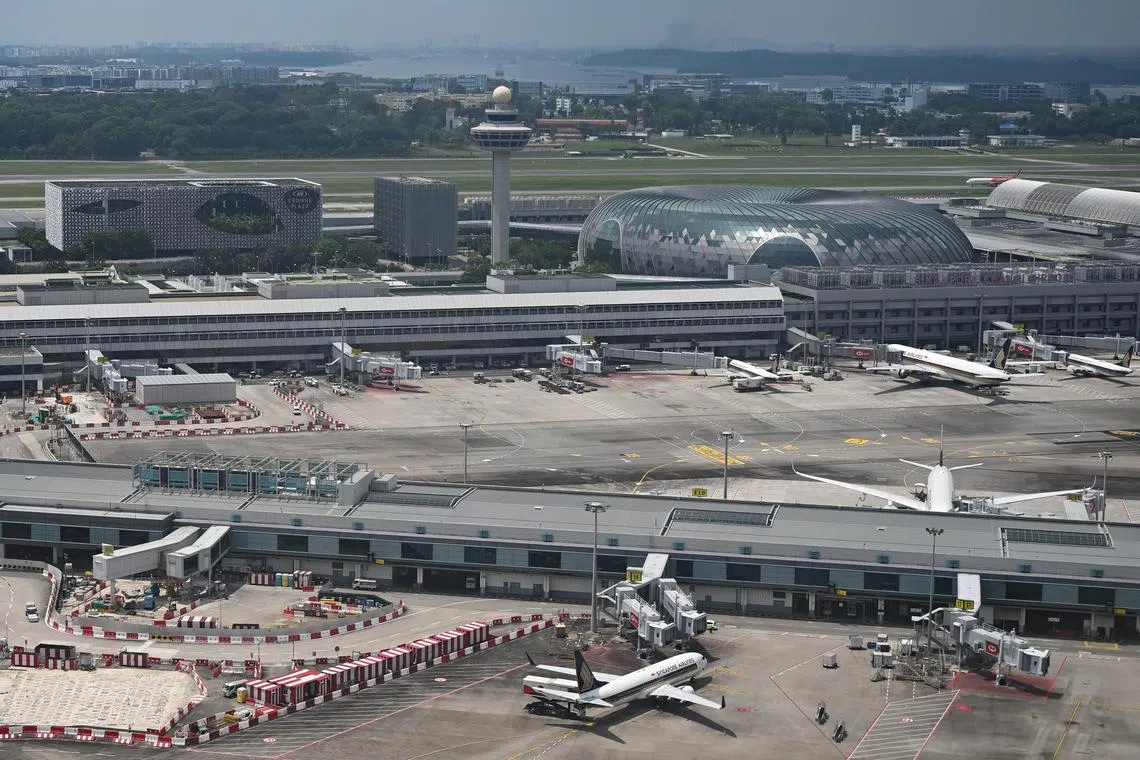Hydrogen-fuelled flights in S’pore could take off in future, but gaps remain: Study
Sign up now: Get ST's newsletters delivered to your inbox

Airlines must find it commercially viable to use hydrogen as an alternative fuel source, those behind the study said.
ST PHOTO: LIM YAOHUI
SINGAPORE - In the 2050s, more than 100 flights departing Changi Airport each day could be powered by hydrogen instead of jet fuel, if estimates from a recently concluded study are anything to go by.
However, as the technology to use liquid hydrogen to power aircraft is currently still under development, there are regulatory and technical hurdles that need to be overcome first, the study flagged.
For instance, while future hydrogen-powered planes flying out of Changi Airport could reach about 74 airports in 20 Asia-Pacific countries and territories, it is vital that these potential destination airports are ready to accommodate such planes.
Airlines must also find it commercially viable to use hydrogen as an alternative fuel source, those behind the study said.
There were more than 164,000 aircraft departures from Changi Airport in 2023, or about 450 each day.
Unlike jet fuel, hydrogen is seen as a cleaner fuel as it does not produce any planet-warming carbon dioxide when burned. But it is more expensive to produce, and there are questions over its safety and viability.
A two-year technical feasibility study looking into these issues was done by airport operator Changi Airport Group (CAG), the Civil Aviation Authority of Singapore (CAAS), aircraft-maker Airbus and chemical firm Linde.
The results were released on Feb 22, on the sidelines of the Singapore Airshow.
The parties involved in the study also came together in February 2022 to form the Singapore Hydrogen Cooperation Committee.
They said hydrogen is expected to play a future part in the decarbonisation of Singapore’s aviation industry, and their findings will help prepare Singapore to incorporate liquid hydrogen into its decarbonisation plans when the technology becomes mature.
According to the study, Singapore’s aviation sector may consume up to 50 tonnes of liquid hydrogen a day to power aircraft from the 2040s, with this potentially climbing to 600 tonnes daily a decade later in a high-demand scenario.
For comparison, Singapore Airlines Group’s fleet of passenger and cargo planes consumed more than 1.7 billion gallons of fuel in financial year 2019/2020 before Covid-19 struck – or about 14,300 tonnes of jet fuel a day.
CAG, CAAS, Airbus and Linde said the study’s liquid hydrogen consumption estimates were based on the premise that future hydrogen aircraft with capacities of about 100 to 200 passengers and operating ranges of about 1,000 to 2,000 nautical miles would enter service in Singapore from about 2035 to 2040.
These parameters are similar to the operating specifications for three hydrogen-powered aircraft concepts that Airbus is developing under its ZEROe programme.
The firm is currently studying using either a fuel cell system, which uses hydrogen to create electricity, or engines that burn hydrogen directly.
It aims to bring one of its ZEROe aircraft concepts to market by 2035.
CAG, CAAS, Airbus and Linde said their study took into account the routes and destinations that could be covered by future hydrogen-powered aircraft from Changi Airport and the possibility of daily flights increasing steadily year on year.
Depending on the level of flight operations, the infrastructure requirements for Changi Airport to refuel hydrogen-powered aircraft would vary, the study found.
This could range from distributing liquid hydrogen on-site using tankers to needing liquid hydrogen pipelines with supporting storage infrastructure.
“As there are still regulatory and technical gaps, and given that the technology is still maturing, the committee will continue monitoring the developments in liquid hydrogen aircraft technology, supply chain and infrastructure solutions for safe adoption into aviation operations,” they added.
Ms Poh Li San, senior vice-president of Terminal 5 specialised systems at CAG, said there are many uncertainties with hydrogen technology, and aspects related to operations, safety, regulation and economics need to be examined further.
“It is prudent to take a phased approach as air hubs study how best to support the use of hydrogen by aircraft,” she added.
CAAS director-general Han Kok Juan said the authority has shared some of the key findings from the hydrogen feasibility study with other relevant government agencies, so longer-term demand for hydrogen can be planned on a national level.
Beyond aviation, Singapore has set its sights on low-carbon hydrogen as a key fuel for its energy sector. The hope is that hydrogen will supply up to half of the Republic’s energy needs by 2050.



